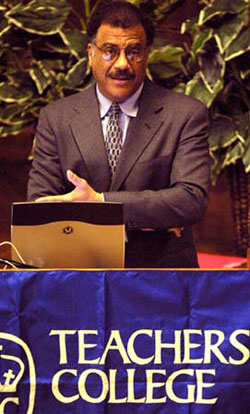Gifford Delivers Inaugural Sussman Lecture
Dr. Bernard R. Gifford, the first Sussman Visiting Professor of Education at TC, delivered the inaugural lecture at Milbank Chapel on, "Closing the Chasm Between Promise and Reality: Location-Independent Learning and Teaching."
The lecture and the Sussman Visiting Professorship were endowed by Trustee Laurie Tisch Sussman. President Arthur Levine opened the event by calling Sussman "one of the most self-effacing, committed persons making a difference in education."
Sussman is the founder and Principal of the Laurie Tisch Sussman Foundation, which supports the arts-especially American art, arts in education, educational reform, and efforts to improve the quality of life in New York City.
Gifford is Professor in the Division of Education, Mathematics, Science, Engineering and Technology at the University of California at Berkeley. He heads Berkeley's InterActive Media Study Group, whose current research agenda focuses on the role of dynamically interactive computer-mediated inscriptions in fostering learning among middle school mathematics students.
Earlier, Gifford was Distinguished Visiting Professor of Technology-mediated Learning and Teaching with the Midwest Higher Education Commission, and Organizing Leader of the Distributed Learning Workshop.
From 1983-89, Gifford served as Chancellor Professor and Dean of the Graduate School of Education at the University of Berkeley.
In 1981 he was Vice President and Professor of Political Science and Public Policy at the University of Rochester and from 1973-77 Gifford was Deputy Chancellor and Chief Fiscal Officer of the New York City Public Schools.
In introducing his lecture, Gifford spoke about why he is so involved with the uses of technology. "My major interest in technology stems from my desire for quality education. I think technology can be used to increase educational opportunities for students who are not well served within conventionally organized classroom settings."
"But more than that," Gifford added, "I see my interest in technology as part of a longer term pattern and that is how do you increase opportunities, and how do you increase social justice?" Gifford's primary argument in his presentation was that "thoughtful incorporation of location-independent Web-based computer-mediated instructional materials in higher education institutions can address the shortcomings of these institutions in carrying out their mission of educating and retaining students."
In an interview with Inside TC before the lecture, Gifford explained his definition of location-independent learning and teaching. Gifford said, "I use the expression location-independent teaching and learning rather than distance education because I feel that the challenge is to use technology in such a way that the quality of the instruction is not diminished as a function of location."
"Computer-mediated materials," Gifford told the packed audience in the Milbank Chapel, "require specific features to insure the promise of educating and retaining students, but unfortunately higher education institutions have not been very successful in integrating technology into their teaching and learning."
Why has higher education failed? Gifford said, "The institutions are resistant to changing their teaching practices and they have relied on the 'Lone Ranger' faculty innovator to carry out this major task."
For Gifford the answer is faculty information sharing and knowledge-building communities of practice. They are "central to transformational change and improvement in the college. These communities of practice are settings within which faculty and academic technologists are provided the means, materials, and encouragement to pose questions, raise problems, offer solutions, construct answers and discuss the changes Internet and Web technologies will cause in canonical instructional settings."
Again, in his exclusive interview, Gifford said he believes that as a society we've only just scratched the surface of the future possibilities of technology and education. "We're at one of those periods where what we need to do is let go of the rigid categories that we tend to live in. Education suffers from the hardening of the categories and we need to begin to look for ways of imagining teaching and learning settings that are very different than the ones that characterize higher education."
Gifford made a strong case for technology's use as a means to end inequities in teaching. "I believe whether or not students are learning on campus, or learning off campus, or learning in a combination of campus classroom work and on-line work, what we need to do is to strive to eliminate the disparities in quality of instruction in those three settings. I also reject the premise that the way you use the Web simply tends to replicate what goes on in the classroom."
He sees the Web as an opportunity to reconceptualize teaching and learning. "In the years to come, the Web will have been fully integrated into the teaching and learning enterprise. We will cease to make distinctions between the instruction that takes place in the classroom, instruction that takes place in an office, and instruction that takes place at home."
The major issue for Gifford is how will the Web help the learner maximize his or her understanding of the concepts, the procedures, and the strategies that educators are trying to communicate? "I am a believer that the Web can be used to expand formal academic educational opportunities as well as professional development opportunities. I'm very interested in seeing higher education use the Web more creatively including using the Web in conjunction with classroom instruction," said Gifford.
Speaking about the role of Teachers College in the future of education and technology, Gifford remarked, "I would like to see Teachers College…become a place where the conversation about that technology cuts across all of the disciplines and where the conversations are not bounded by conventions or prejudices but where the conversations are compelled by the possibilities. I can't think of a better place to conduct those conversations across the variety of disciplines."
Published Tuesday, Sep. 18, 2001
